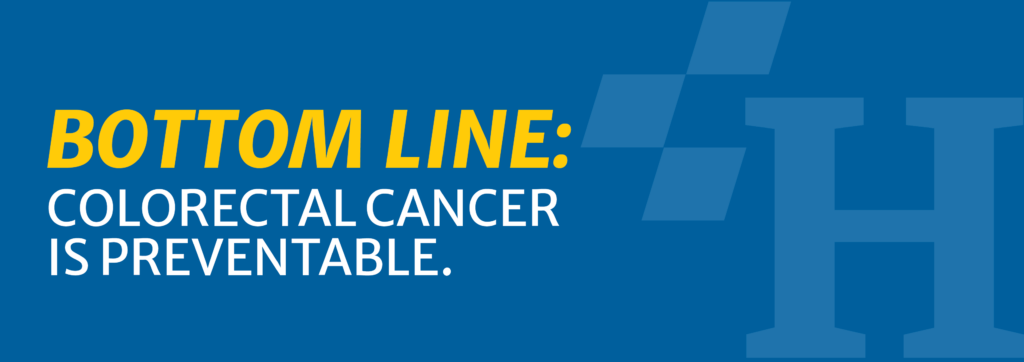Bottom Line: Colorectal Cancer is Preventable

Throughout the year, and especially during March for Colorectal Cancer Awareness Month, Harbin Clinic encourages everyone 45 years of age and older to schedule a preventative screening for colorectal cancer. Why do our physicians encourage this so strongly? Bottom line: colorectal cancer is preventable.
When detected early and before cancer has spread, the colorectal cancer 5-year survival rate is 90%1. Colorectal cancer screenings, including colonoscopies, are essential in early detection and prevention. A colonoscopy not only reviews the health of the entire colon but can also biopsy and remove any suspicious, potentially pre-cancerous polyps.
According to the American Cancer Society, colorectal cancer is the second most common cause of US cancer-related deaths2 when men and women are combined.
It’s expected that colorectal cancer will be the cause of death for more than 52,000 Americans this year. While this number is trending downward due to more regular screenings, the rate of colorectal cancer diagnoses in individuals younger than 50 continues to increase3. The American Cancer Society and US Preventative Services Task Force changed the recommended preventative screening age from 50 to 45 in 2021.
“We encourage everyone age 45 and over to talk to their primary care physician about screening for colon cancer,” says Harbin Clinic Gastroenterologist Dr. Roman Galysh. “It’s vital to get screened, because the earlier we can detect the cancer, the better chance you have of beating it.”
Know Your Risk & Keep It Top of Mind
Understanding your lifestyle and family-related risk factors for colorectal cancer can help you determine when you should inquire about regular screenings and tests. The American Cancer Society states that the links between diet, weight, exercise, and colorectal cancer risk are some of the strongest for any type of cancer. Additionally, family history, age and personal history play a significant role in an individual’s risk.
Below are some important risk factors to be aware of and discuss with your primary care doctor:
· Age – the risk of colorectal cancer increases with age and is more common after age 50.
· Family history – approximately 1 in 3 people diagnosed with colorectal cancer have a family history of the disease.
· Personal history – having a history of adenomatous polyps or inflammatory bowel diseases such as Crohn’s disease increases your risk of developing colorectal cancer.
· Nutrition – a diet that’s high in processed and red meats may raise your risk of developing colorectal cancer.
Read more about risk factors here.
Prevention
When discovered during its early stages, colorectal cancer is one of the easier cancers to treat.
The expert physicians at Harbin Clinic Gastroenterology Endoscopy and GI Lab use the most innovative and cutting-edge screening technologies and methods for detecting colorectal cancer, including a colonoscopy.
“Colon cancer is preventable by identifying and removing precancerous polyps that are detected with a screening colonoscopy,” says Dr. Galysh. “Patients typically have monitored anesthesia care during the colonoscopy. The patient will be asleep which allows them to have a comfortable experience during the procedure.”
Get to the bottom of understanding the health of your colon and any potential risks by speaking with your primary care physician. For more information, visit Harbin Clinic Gastroenterology at https://harbinclinic.com/gastroenterology or find a provider here.
Hear from a colon cancer survivor, Christi Malec, on how a colonoscopy saved her life.
- Survival Rates for Colorectal Cancer, American Cancer Society https://www.cancer.org/cancer/colon-rectal-cancer/detection-diagnosis-staging/survival-rates.html Accessed 2/22/22.
- Key Statistics for Colorectal Cancer, American Cancer Society https://www.cancer.org/cancer/colon-rectal-cancer/about/key-statistics.html Accessed 2/18/22.
- Fight Colorectal Cancer https://fightcolorectalcancer.org/about-colorectal-cancer/general-information/facts-stats/ Accessed 2/28/22
Content updated March 2023.


